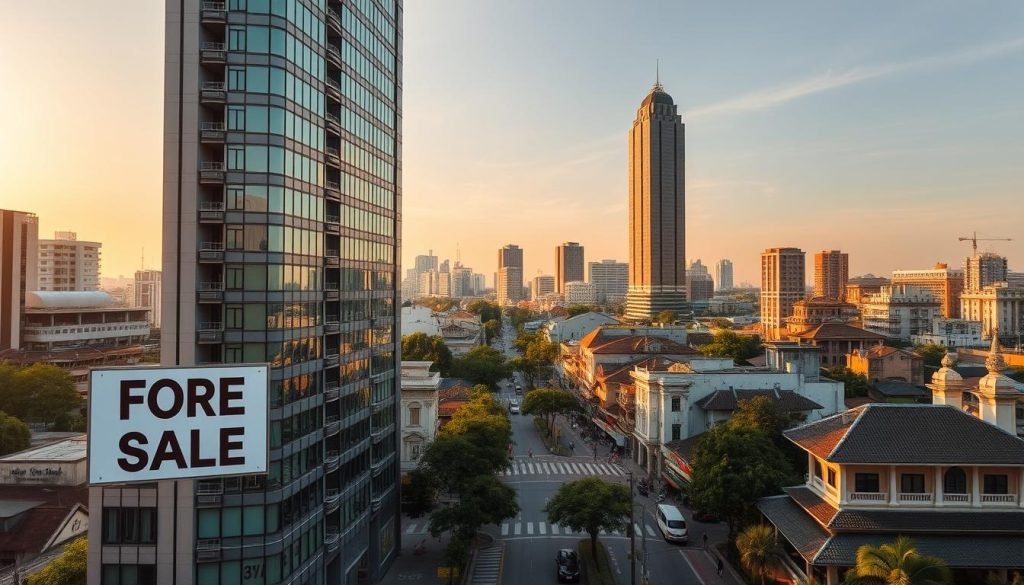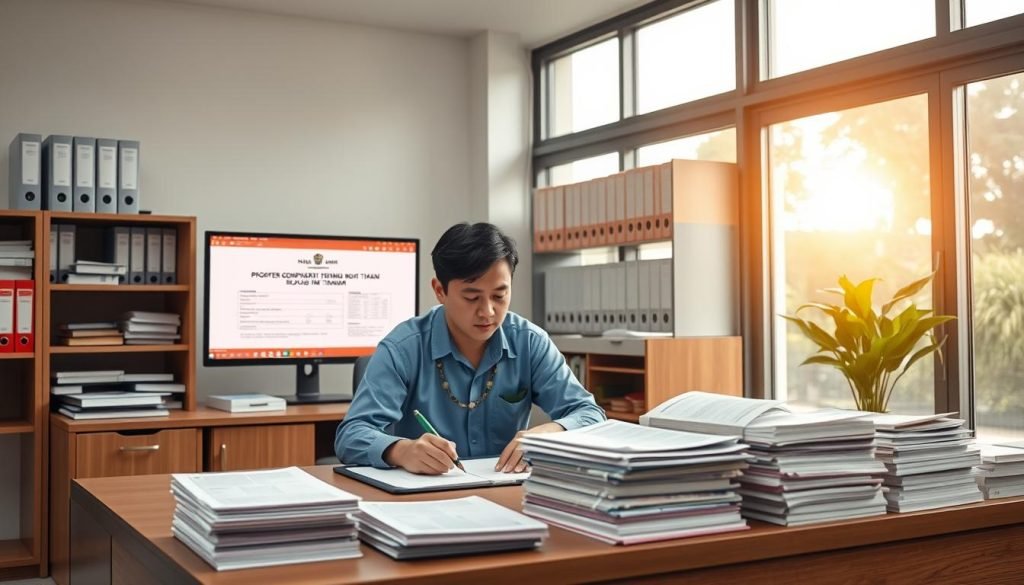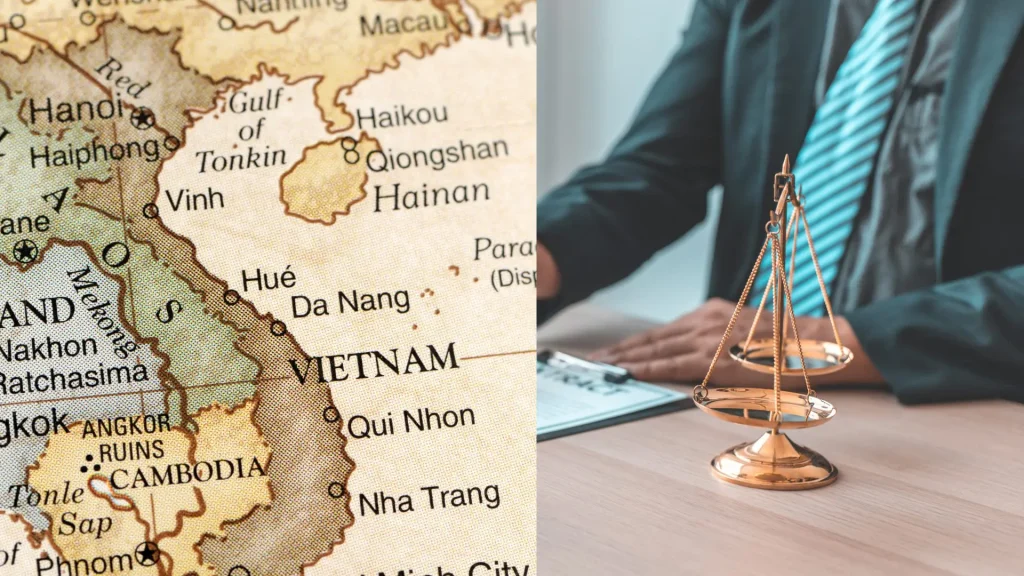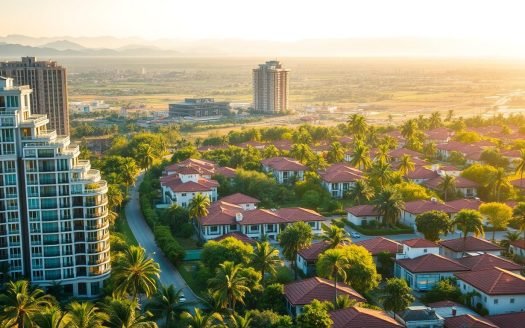Vietnam Property Laws: What Foreign Buyers Need to Know

As a foreign buyer, it’s key to know the laws about foreign ownership in Vietnam. The real estate market here is bouncing back after COVID-19. This is seen in more deals and higher prices in big cities like Hanoi and Ho Chi Minh City.
It’s important to understand the current market and the rules for you. Knowing the property laws in Vietnam helps you make smart choices. It also makes it easier to move through the market.
Key Takeaways
- Understanding foreign ownership regulations is key for foreign buyers.
- The Vietnamese real estate market is bouncing back strongly after COVID-19.
- Big cities like Hanoi and Ho Chi Minh City are seeing a lot of deals and price hikes.
- Knowing local property laws helps in making informed decisions.
- Foreign buyers must get to know the legal framework.
Current Vietnam Property Laws for Foreigners
The Vietnamese government has set clear rules for foreign property ownership. It’s important for investors to know these laws well. This knowledge is key for a successful investment in Vietnam’s real estate.
The 2015 Housing Law and Its Amendments
The 2015 Housing Law is a major part of Vietnam’s property rules. It has been updated to give more rights to foreign buyers. Now, they can own homes under certain conditions.
Foreigners can buy, lease, or inherit commercial housing in investment projects. This change has opened new doors for foreign investors in Vietnam’s property market.
Types of Properties Foreigners Can Purchase
Foreigners can buy and own homes in Vietnam, but there are limits. They can usually buy apartments or houses in approved projects.
| Property Type | Eligibility for Foreigners | Ownership Conditions |
|---|---|---|
| Apartments in investment projects | Yes | Must be part of a licensed project |
| Houses in investment projects | Yes | Must comply with project regulations |
| Land use rights | No | Foreigners cannot acquire land use rights |
Ownership Duration and Renewal Options
Foreigners can own properties in Vietnam for up to 50 years. They can also renew this for another 50 years. This gives foreign investors long-term security.
Recent Legal Changes Affecting Foreign Buyers
New laws have changed the rules for foreign buyers in Vietnam. The 2024 Land Law says foreigners can’t own land but can buy or lease homes in projects. Knowing these changes is important for foreign investors.
Eligibility Requirements for Foreign Buyers
Foreign buyers need to know the rules to buy property in Vietnam. The country has rules to make sure foreign investment is safe and controlled.
Visa and Residency Requirements
To own property in Vietnam, you need a valid visa. The visa type depends on your situation. For example, a temporary residence visa or a long-term visa might be needed.
Foreigners married to Vietnamese citizens or overseas Vietnamese can own property like locals. This makes the process easier.
Residency is also important. Owning property can help get a residence visa. Knowing the visa and residency rules is key.
Investment Thresholds and Qualifications
Vietnam has rules for foreign buyers. You might need to show you can afford the property. This could mean proving your income or assets.
Restricted Areas and Properties
Some areas and properties in Vietnam are off-limits to foreign buyers. These restrictions protect national security, the environment, and culture.
For example, you can’t own property near borders or in sensitive areas. Knowing these rules helps avoid legal issues.
Quota Limitations in Residential Projects
Vietnam has limits on foreign ownership in homes. There’s a cap on how many units foreigners can own in a project.
The quota depends on the project’s location and type. For example, in some buildings, foreigners can own up to 30% of the units. It’s important to know these limits to buy property.
| Eligibility Criteria | Description | Remarks |
|---|---|---|
| Visa Requirements | Valid visa, potentially temporary or long-term residence visa | Dependent on individual circumstances |
| Residency Requirements | Having property can aid in obtaining residency | Does not automatically grant residency |
| Investment Thresholds | Financial capability to purchase and maintain property | Proof of income or financial assets may be required |
| Restricted Areas | Areas near borders or sensitive for security | Restrictions in place for national security |
| Quota Limitations | Cap on foreign ownership in residential projects | Can vary by project location and type |
Step-by-Step Guide to Purchasing Property in Vietnam
Buying property in Vietnam can seem complex, but with the right help, you can do it well. As a foreign buyer, knowing the local rules and steps is key to a smart investment.
Finding and Selecting Suitable Properties
The first step is to find a property that fits your needs and budget. Look at different areas, thinking about things like amenities, transport, and market trends.
Key considerations include the property’s location, the developer’s reputation, and the type of property you want (residential, commercial, or land).
Due Diligence Process
After finding a property, do a deep dive into due diligence. This means checking the property’s title and inspecting it to make sure it’s as described.
Title Verification
Ask for legal documents from the seller or developer and check the property’s ownership. This is important to avoid any legal problems.
Property Inspection
Inspect the property yourself to find any issues, like structural damage. It’s best to get professionals to do a detailed check.
Negotiation and Purchase Agreement
After due diligence, you can start negotiating the purchase agreement. This contract outlines the sale’s terms, including price, payment schedule, and any conditions.
Make sure the agreement follows Vietnamese law and protects your interests as a buyer.
Payment Procedures and Banking Considerations
It’s important to know how to pay and the banking options available. Be aware of currency exchange rules and the role of escrow services in securing your payment.
Currency Exchange Regulations
Vietnam has rules for exchanging currencies for foreign transactions. Talk to your bank or a financial advisor to understand these rules for your purchase.
Escrow Services
Using an escrow service adds security to your transaction. It holds the payment until certain conditions are met.
| Payment Method | Currency Exchange Considerations | Security Measures |
|---|---|---|
| Bank Transfer | Compliance with Vietnamese regulations | Escrow services |
| Cash Payment | Conversion rates and fees | Secure receipt and documentation |
Legal Documentation and Registration Process
Buying property in Vietnam can be tricky. But knowing what documents you need is a good start. As a foreign buyer, you must follow the country’s laws to make the process smooth.
Required Documents for Foreign Buyers
You’ll need a few important documents to buy property in Vietnam. These include a valid passport, a visa (if needed), and proof of your financial status. Make sure all your documents are current and meet Vietnamese rules.
Property Registration Procedure
The property registration process has several steps. First, you’ll submit your purchase agreement to the right authorities. Then, they’ll check if your application meets Vietnam’s property laws.

Title Certificate (Pink Book) Acquisition
After registration, you’ll get a Title Certificate, or “Pink Book.” This proves you own the property and is key for any future deals. The Pink Book also confirms your property and land rights.
Common Legal Pitfalls to Avoid
Foreign buyers should watch out for legal traps. Make sure the property isn’t tied up in debts or disputes. Doing your homework is essential to avoid these problems.
Legal Protections for Foreign Investors
Vietnamese law protects foreign investors in some ways. You have the right to appeal certain property ownership decisions. Knowing these rights can help protect your investment.
By carefully following the legal steps, you can make a secure and successful property purchase in Vietnam.
Alternative Investment Structures and Professional Support
When you think about investing in Vietnam, you have many choices. As a foreign investor, knowing these options is key to making smart choices.
Long-term Leasing Options
One good choice is long-term leasing. Foreign companies can lease property for up to 50 years or more, with chances to renew. This is great for businesses wanting to be in Vietnam without owning property long-term.
Long-term leases offer stability for your business. They also give you more freedom in your investment. Make sure to read your lease carefully and know your rights and duties under Vietnamese law.
Establishing a Vietnamese Company for Property Ownership
Another way is to start a Vietnamese company to own property. This can give you more flexibility and legal protection than owning it yourself. By having a local company, owning property can be easier.
But, starting a Vietnamese company means following local laws and rules. It’s important to get help from legal experts to make sure your company is set up right and all documents are correct.
Working with Local Real Estate Agents
Dealing with Vietnam’s real estate market can be tough, even for foreign investors. Local real estate agents can offer great help. They can find good properties, explain the market, and help with buying.
Choose a real estate agent with experience with foreign clients and knows the local market well. Their knowledge can make your buying process smoother.
Importance of Legal Representation
Having a lawyer is very important when investing in Vietnamese property. A good lawyer can help you understand local laws, protect your rights, and make sure you follow all rules.
Lawyers are key in making your investment successful. They can review contracts and advise on the best ways to invest. Make sure your lawyer knows a lot about Vietnamese property law.
Banking and Financial Services for American Investors
American investors can find many banking and financial services in Vietnam. Local banks have products like mortgage loans and investment accounts for foreign investors.
When picking a bank, think about fees, loan terms, and experience with international deals. A good bank can make the financial side of your investment easier and give you peace of mind.
Conclusion
Thinking about buying property in Vietnam? It’s key to know the laws well. The rules on owning property, how much foreigners can own, and the steps to buy are detailed. Knowing these can make you feel more sure about your choices.
It’s important to learn about the current laws, like the 2015 Housing Law and its updates. This knowledge helps you follow the rules and avoid problems. This way, you can take advantage of Vietnam’s growing real estate market.
When you buy property in Vietnam, knowing what you need to do is vital. You’ll need to meet certain requirements, have the right documents, and follow the registration steps. Getting help from local real estate agents and lawyers can be very helpful.
By learning about Vietnam’s property laws and getting expert advice, you can make smart choices. This will help you reach your goals in Vietnam’s real estate market.
FAQ
What are the current laws governing foreign property ownership in Vietnam?
The 2015 Housing Law and its updates mainly cover foreign property ownership in Vietnam. They outline what properties foreigners can buy, how long they can own them, and other key rules.
What types of properties can foreigners purchase in Vietnam?
Foreigners can buy apartments and houses in Vietnam. But, there are some rules and limits, like quotas in certain projects and restricted areas.
How long can foreigners own property in Vietnam?
Foreigners can own property in Vietnam for up to 50 years. They can also renew this for another 50 years.
What are the eligibility requirements for foreign buyers in Vietnam?
To buy property in Vietnam, foreigners need a valid visa and to meet certain investment levels. They must also follow the rules for buying in residential projects.
What is the process for purchasing property in Vietnam?
Buying property in Vietnam starts with finding a property. Then, you do your research, negotiate, and pay for it. You might need a local agent and bank help.
What legal documentation is required for foreign buyers in Vietnam?
Foreign buyers need a passport, visa, and other documents to register their property. This is to get the Title Certificate (Pink Book).
What are the common legal pitfalls to avoid when buying property in Vietnam?
Avoid not checking property titles, not inspecting properties well, and not following the rules. Working with local lawyers can help avoid these issues.
Can foreigners establish a Vietnamese company to own property?
Yes, foreigners can start a Vietnamese company to own property. This offers another way to invest, but you must follow company laws.
What are the benefits of working with local real estate agents and legal representation?
Local agents and lawyers offer expert advice and help. They guide you through the buying process, helping you understand and follow the rules.
What banking and financial services are available to foreign investors in Vietnam?
Foreign investors in Vietnam can use various banking services. This includes loans for property and other financial products to help with investing.





